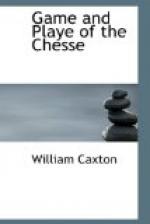The .iiii. is of marchantes and chaungers.
The .v. is of phisicyens and cirugiens and apotecaries.
The .vi. is of tauerners and hostelers.
The .vii. is of y’e gardes of the citees & tollers & customers.
The .viii. is of ribauldes disepleyars and currours.
BOOK IV.
The .iiii. traytee is of the meuyng
and yssue of them And hath .viii.
chapitres.
The first is of the eschequer.
The seconde of the yssue and progression of the kynge.
The thirde of the yssue of the quene.
The fourth is of the yssue of the alphyns.
The fifth is of the yssue of the knyghtes.
The sixty chapitre of the yssue of the rooks.
The seuenth is of the meuynge & yssue of the comyn peple.
And the eyght and laste chapitre
is of the epilegacion and of the
recapitulacion of all these forsaid
chapitres.
GLOSSARY
INDEX
INTRODUCTION
The readers of the “Antiquary” will remember the anecdote told with so much effusion by Jonathan Oldbuck. ’"Davy Wilson,” he said, “commonly called Snuffy Davy, from his inveterate addiction to black rappee, was the very prince of scouts for searching blind alleys, cellars, and stalls, for rare volumes. He had the scent of a slow-hound, sir, and the snap of a bull-dog. He would detect you an old black-letter ballad among the leaves of a law-paper, and find an editio princeps under the mask of a school Corderius. Snuffy Davy bought the ‘Game of Chess, 1474,’ the first book ever printed in England, from a stall in Holland for about two groschen, or two-pence of our money. He sold it to Osborne for twenty pounds, and as many books as came to twenty pounds more. Osborne re-sold this inimitable windfall to Dr. Askew for sixty guineas. At Dr. Askew’s sale,” continued the old gentleman, kindling as he spoke, “this inestimable treasure blazed forth in its full value and was purchased by Royalty itself for one hundred and seventy pounds! Could a copy now occur, Lord only knows,” he ejaculated with a deep sigh and lifted-up hands, “Lord only knows what would be its ransom; and yet it was originally secured, by skill and research, for the easy equivalent of two-pence sterling."’
Sir Walter Scott in a footnote adds:—“This bibliomaniacal anecdote is literally true; and David Wilson, the author need not tell his brethren of the Roxburghe and Bannatyne Clubs, was a real personage.” Mr. Blades, whose iconoclastic temper is not moved to mercy even by this good story, says that although it “looks like a true bibliographical anecdote,” its appearance is deceptive, and that “not a single statement is founded on fact."[1]




